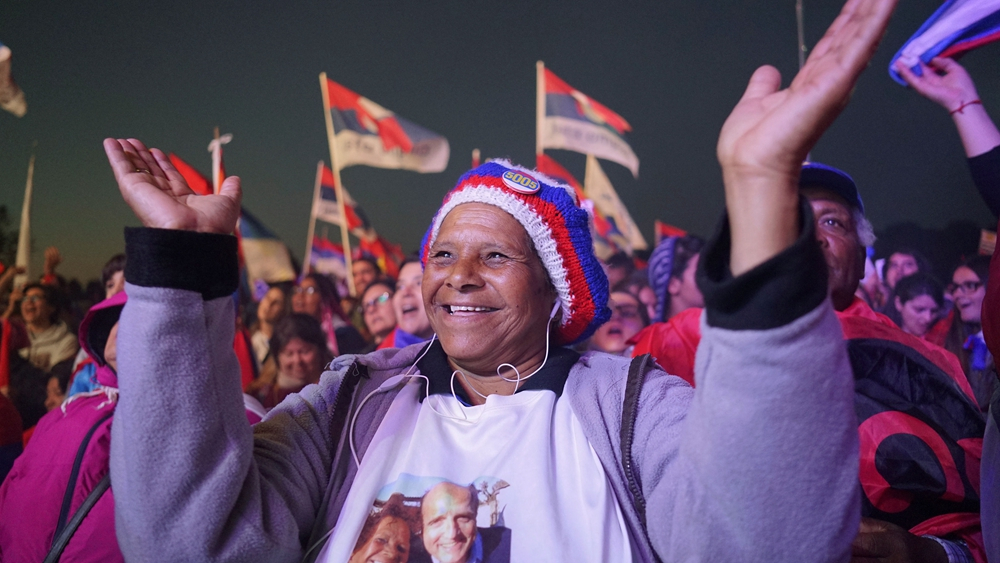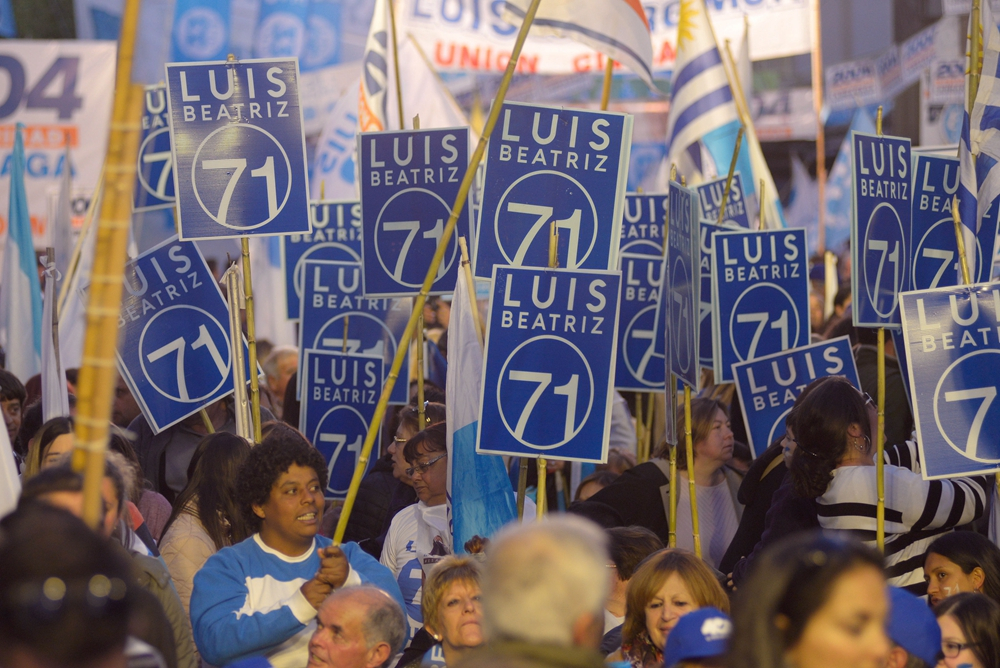03:16

Uruguay, like its much bigger neighbor Argentina, is heading to the polls on Sunday to elect a new president and Congress.
Under the governing Frente Amplio (Broad Front), Uruguay made headlines as the country which legalized marijuana – the world's first one to do so – same-sex marriage and abortion. But now, rising crime and a slowing economy have made the outcome of this election uncertain.
According to the latest polls, support for 62-year-old Daniel Martinez, the Frente Amplio presidential candidate, is at around 40 percent. That gives him a double-digit lead over his closest rival, but not enough to win outright. For that to happen, the candidate must get 50 percent of the ballots plus one vote.
A victory in Sunday's election could mean a fourth consecutive term for the party that has been in office for the last fifteen years, governing with a socialist-like agenda.

Uruguay's presidential candidate Daniel Martinez of the Frente Amplio looks on during his closing campaign rally ahead of Sunday's presidential election, in Montevideo, Uruguay, October 23, 2019. /Reuters Photo
Uruguay's presidential candidate Daniel Martinez of the Frente Amplio looks on during his closing campaign rally ahead of Sunday's presidential election, in Montevideo, Uruguay, October 23, 2019. /Reuters Photo
"You can make mistakes, but you need to have the ability to find your path again in order to generate wealth, yes, but also to distribute it," said Martinez at his closing ceremony.
Under the Frente Amplio, Uruguay managed to avoid financial crises and recessions, allowing the government to invest in social programs. But the economy that had been growing nonstop since 2013 started to stagnate – this year set to grow less than one percent – due to the crisis in Argentina, and global narco-trafficking contributed to a homicide rate that jumped more than 45 percent last year, hitting record levels.
"Public safety remains a top concern and it links to drug trafficking, which is affecting all of Latin America. Then there is a budget deficit of around 5 percent of the GDP impacting education and new investments," said Gerardo Caetano, a political analyst at Uruguay's University of the Republic.

Luis Lacalle Pou of the National Party arrives with his wife Lorena Ponce de Leon to his closing campaign rally ahead of Sunday's presidential election in Las Piedras, Uruguay, October 23, 2019. /Reuters Photo
Luis Lacalle Pou of the National Party arrives with his wife Lorena Ponce de Leon to his closing campaign rally ahead of Sunday's presidential election in Las Piedras, Uruguay, October 23, 2019. /Reuters Photo
Martinez' closest rival, 46-year-old Luis Lacalle Pou of the center-right National Party, who is running for the second time, is hoping to count with the support of other parties to help him win and form what he said will be a government of those who want an end of the left mandate.
"We know we are heading towards a political alliance with at least four or more parties that want change and peace," said Lacalle Pou at his own closing campaign ceremony.
And that is why Uruguayans will not just vote for president and members of congress on Sunday but also for a controversial referendum that proposes to get tough on crime.

Supporters of Luis Lacalle Pou of the National Party attend his closing campaign rally ahead of Sunday's presidential election in Las Piedras, Uruguay, October 23, 2019. /Reuters Photo
Supporters of Luis Lacalle Pou of the National Party attend his closing campaign rally ahead of Sunday's presidential election in Las Piedras, Uruguay, October 23, 2019. /Reuters Photo
The polls indicated that the "Live without Fear" referendum could pass, opening the doors to lifetime prisons, night-time raids by police and military involvement in domestic law enforcement.
But with memories of Uruguay's military rule – 1973 to 1985 – opinions about the measure are sharply divided.
"I am going to vote for it because I live in a dangerous area, and I can't take it anymore," said Gerardo Camarote, a 20-year-old student who added he had witnessed an increasing amount of robberies on the streets.
"I am horrified by the idea of soldiers in the streets. I don't want that in this country," said Aida Martinez, a public employee, who thinks the bill could cause more damage.
According to several pollsters, Uruguay will likely hold a runoff in November between the same parties – the Frente Amplio and the National Party, as in 2014. The news this time is that congress will be fragmented with a minimum of six parties and a maximum of nine.
"We always say that being Uruguayan is a profession because one needs to work a lot to make this small country viable, especially when it is enclaved between two giants such as Brazil and Argentina," said Caetano.
(Cover: A supporter of Uruguay's presidential candidate Daniel Martinez of the Frente Amplio gestures during his closing campaign rally ahead of Sunday's presidential election in Montevideo, Uruguay, October 23, 2019. /Reuters Photo)